Commerce and Republics: Ferguson and Constant
Adam Ferguson, (1723-1816)

Ferguson was born in Scotland and educated at St. Andrews. He became a chaplain of the Black Watch Highlander regiment, but on losing his faith, he succeeded David Hume in 1757 as librarian to the Faculty of Advocates in Edinburgh. Ferguson held successive chairs at the University of Edinburgh, first in Natural Philosophy (1759), then in Moral Philosophy and Pneumatics (1764). In 1767, Ferguson published his masterpiece, the Essay on Civil Society - a "natural" history of the progress of mankind. Ferguson rejected speculation about the origins of human nature, being more concerned to detail its reality and consequences. He deplored all talk of "states of nature" and other such artifices of social contract theory, arguing instead that:
"Like the winds that we come we know not whence and blow whither soever they list, the forces of society are derived from an obscure and distant origin. They arise before the date of philosophy, from the instincts, not the speculations of men." (Ferguson, 1767: Pt. 3.2).
Like Montesquieu, this is a descriptive and explanatory project. And like Montesqueiu, it has an underlying normative agenda.
Benjamin Constant (1767-1830)

A wide-ranging writer whose most important work involves some reflections on politics in the wake of the French Revolution. His 'The LIberty of the Ancients Compared with that of the Moderns' remains a powerfully influential text. Constant was French/Swiss, he supported Bonaparte in 1797 and 1799 - but became disillusioned with him when he had himself made Emperor. Nonetheless, Constant was woed by Bonaparte when he returned to Paris in the dramatic '100 Days' and Constant agreed to design an amendment to the Charte that Louis XVIII had drawn up and agreed to serve in his short-lived government - ended by the Battle of Waterloo. His other writing includes his Red Notebook - which purports to be an Autobiography covering his youth, and in particular his adventures on a visit to England. Constant's most popular work was his novel Adolphe which is also heavily autobiographical. It is instructive to read these texts alongside the novels and autobiographical attempts by Stendhal whom we encountered in term 1.
Class reading
You should read sections IX and X of Part One and then Ferguson's Part VI Of Corruption and Political Slavery - in which Ferguson raises concerns about the tendency of commerce and luxury to undermine liberty and political stability.
And read Constant's essay on liberty - available in Biancamaria Fontana (ed) Constant: Political Writings (Cambridge) but on line here
Class questions:
How does Ferguson understand happiness - and is there any parallel here with Montesquieu's discussion of liberty and security (in Spirit of the Laws Books 11 and 12)? And Ferguson Pt 3, section 2, and 6.
How does Ferguson use Montesquieu's account of the different forms of Government? (see section 1, X.)
Should we see Ferguson (or Montesquieu) as climatic determinists? Is there anything to be said in favour of this perspective? (If you want to think about this have a look at Ferguson, Section 1 of Part 3 - and Montesquieu's Bks 14,15 and 17 Link opens in a new window)
What does Ferguson understand by corruption? What (for Ferguson) is the driver of corruption in a modern state - and what remedy is there for it? And how reasonable is the concern?
What is Constant claiming about liberty in the modern world? How different is it - and can we really separate the concern for security from the need for a degree of civic commitment?
How far are Ferguson and Constant at cross purposes - or in agreement about the fragility of the modern order and what is needed to secure it.
If you want to follow up any aspects of Montesquieu you can find his work at:
https://oll.libertyfund.org/titles/montesquieu-complete-works-4-vols-1777Link opens in a new window
His essay on Universal Monarchy is [mont_univ_mon_eng.pdf]here
And Hume's Essays (with his essay on National Characters) can be found at:
